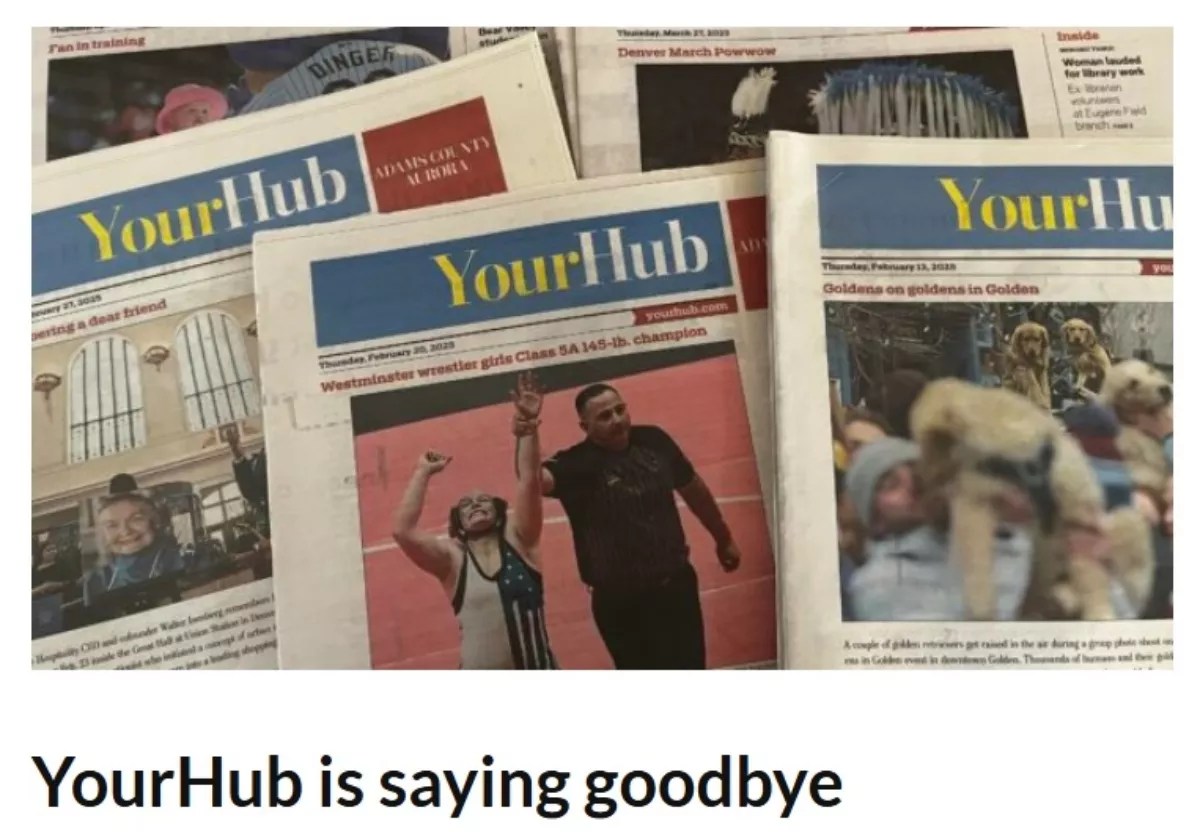
Photo by J. Knight

Audio By Carbonatix
YourHub has died at the tender age of twenty and will be buried soon. The community journalism project’s final offering was published in the Denver Post on May 29 and its content will vanish from YourHub’s online home at the end of June.
In this case, the internet isn’t forever.
But YourHub doesn’t deserve to be forgotten. When it debuted in the Rocky Mountain News in early 2005, some media experts were wowed by the concept, which gave users the opportunity to reach readers in specific parts of the Rocky’s distribution area at a much lower cost than advertising in the main paper. But YourHub not only outlasted its paper of origin – the Rocky was shuttered in February 2009, and YourHub moved to the Post – but survived for two decades in a changing media landscape that has destroyed or depleted many major metropolitan newspapers.
This success translated to users such as Jim Smith of Golden Real Estate.
A former journalist, Smith began contributing to YourHub in its first year of operation, during a period when he was working as an agent for firms such as Coldwell Banker and RE/MAX. But he credits his writing in YourHub and other community newspapers across greater Denver with helping him launch and build his own agency. Today, he has six agents working for him and notes that “I have never picked up the phone and cold-called anyone in my entire career. People call me because they’ve read my articles – so I don’t have to sell myself.”
Why did the Post finally stick a fork in YourHub? Post editor Lee Ann Colacioppo hasn’t yet responded to Westword‘s questions on the subject. But the paper, which has suffered significant shrinkage since being obtained by the vampiric hedge fund Alden Global Capital, is definitely in another of its intermittent downsizing cycles. As reported on May 30 by Corey Hutchins in his Colorado Media newsletter, the paper recently laid off a deputy sports editor, a part-time photo editor and a part-time breaking news reporter.
YourHub’s staff has also been pruned over the years; five community managers, representing a big chunk of its staff, were sent packing in 2013. But on May 28, the site shared its own obituary.
“Starting after the May 29 issue, YourHub will no longer be included in Thursday editions of The Denver Post, either in print or in the digital replica,” wrote the enterprise’s managing editor, Julie Vossler-Henderson. “The YourHub website…will remain online through the end of June, but new submissions will not be approved or published as of May 29. This shift is part of our effort to focus our resources on other areas of news coverage. But don’t worry – you can still stay connected with what’s happening around the metro area through The Denver Post‘s event calendars at denverpost.com/event-calendar, curated by our team at The Know. If you have local news tips or items you would’ve normally sent to YourHub, feel free to reach out to the newsroom directly at newsroom@denverpost.com.”
Vossler-Henderson concluded: “Thanks for being part of the YourHub community.”

A screen capture of the YourHub farewell announcement.
YourHub
That community didn’t yet exist in April 2005, when Rocky editor, publisher and president John Temple initially outlined YourHub to Westword. The plan was for the tabloid to deploy 39 zoned Web versions of YourHub, each corresponding to a different portion of the metro area. Temple made YourHub sound practically altruistic: “We can fulfill a role of helping to connect the community. Readers will be able to share their lives – and we’re giving them a platform to do it,” he proclaimed. But profit was clearly the goal, with salespeople already pitching advertisers about the concept; contributors wouldn’t be paid for their articles or photographs.
Despite the lack of remuneration, Temple was confident the sites would attract lots of submissions – and he was right. Some people penned pieces about local subjects that simply interested them, but YourHub was particularly attractive to business-oriented individuals like Smith who wanted to hype events or services; the model gave promoters the ability to micro-target their message at a specific audience.
By 2025, YourHub’s 39 zones had dwindled to six tabs representing Denver and Aurora plus four counties: Adams, Arapahoe, Douglas and Jefferson, each with numerous community sites – Adams County includes Brighton, Commerce City, Federal Heights, Northglenn, Thornton and Westminster – populated with items intended to appeal to residents of each place.
Many of these towns and suburbs had weekly newspapers that did something similar, and while some of these media outlets still survive, they’re in flux. In May, as also detailed by Hutchins, the National Trust for Local News, which handled more than two dozen local newspapers, sold 21 of them to the Arizona-based Times Media Group. The remaining seven publications will be operated by the renamed Colorado Trust for Local News. (The National Trust had already killed off Life on Capitol Hill and the Washington Park Profile in March.)
Today, Temple devotes much of his time to Amuse Labs, a San Francisco-based company he co-founded that specializes in software for designing puzzles and other games; his clients include the Los Angeles Times and the Boston Globe. But he remembers vividly the hands-on work required to get YourHub up and running. “I had to create the profanity filter myself,” he says. “I couldn’t ask anybody to do it, because if I did, I would be putting them in a position where they might feel uncomfortable, writing words like ‘fuck’ and ‘cocksucker.'”
These efforts were definitely worthwhile, he says: “We’ve clearly seen that people want to share content. Whether YourHub was the perfect form for doing so is obviously a legitimate question. But I think it was a very early experiment or venture in that space. Facebook was not a ubiquitous thing at that time; it was really only in colleges then. Instagram didn’t exist, and YouTube was nothing like it is today. But YourHub combined a business imperative and a community imperative, where people wanted to celebrate life in their community – and their community was smaller than the wide area a metro newspaper covers.”
After the Post‘s decision to kill YourHub went public, Temple reveals, “I got a really nice note from someone who was very active in the nonprofit volunteer community, saying, ‘Thanks for doing YourHub and giving us a place to shine the light on good things that are happening in the community.’ And that’s important, because newspapers are far more than just accountability journalism. I’ll bet you that the Denver Post, shell of itself that it is, still publishes a horoscope.”
That’s a wager Temple would win: YourHub may be gone, but the Post horoscope lives on.
Temple thinks the Post could have done more with YourHub. “They didn’t really have a vision of what we could have developed over time,” he says, adding, “I wish they’d done something more creative than just shutting it down. Maybe evolve it into something more contemporary.” But he concedes that making this happen would have been difficult given technological advances: “Facebook and Google have blown newspaper advertising out of the water. Now, a small advertiser can target in so many different ways.”
For his part, Smith isn’t lamenting the disappearance of YourHub thanks to a new opportunity. His housing-scene write-ups were so popular that the Post gave him an affordable rate to print his articles at the bottom of its weekly real estate section. “I was lucky,” he acknowledges.
Luckier than YourHub, anyway.